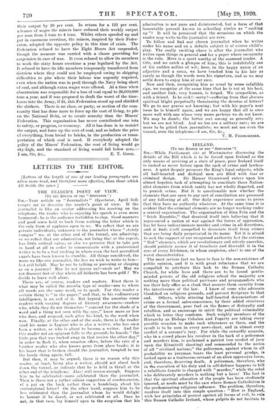LETTERS TO THE EDITOR.
[Letters of the length of one of our leading paragraphs are often more read, and therefore more effective, than those which fill treble the space] TIIE READER'S POINT OF VIEW.
[To THE EDITOR OF THE " SPECTATOR."' SIR,—Your article on "Journalists" (Spectator, April 3rd) tempts me to describe the reader's point of view. If the journalist is like an orator addressing hiS meeting on the telephone, the reader who is enjoying his speech is even more hampered: he is the audience forbidden to clap. Good manners and good sense hold us back from writing the letter which is the only form of applause open to us. We reflect that we are private individuals, unknown to the journalist whose " stately rumpus" we, at the other end of the tunnel, are admiring; or we reflect that our admiration, not being that of the expert, has little critical value; or else we perceive that to take pen in hand at all in order to communicate with a professional writer is to be a fool rushing in where even the best accredited angels have been known to stumble. All things considered, the more we like our journalist, the less we wish to write to him— lest evil befall. May he not be talking or pursuing or sleeping or on a journey? May he not ignore us?—snub us? May we not discover feet of clay where all hitherto has been gold ? We decide to leave well alone.
There are, of course, readers and readers. First there is what may be called the amoeba type of reader—one to whom all words are the same word, so to speak. For this reader. a certain thing is " in the paper," and that, to his rudimentary intelligence, is an end of it. But beyond the amoebae come readers with varying degrees of literary awareness—readers who, while they do not themselves " contend for the shade of a word and a thing not seen with the eyes," know more. or less who does, and respond, each after his kind, to the word, when won. Finally, at the other end of the scale, there is the reader (and his name is Legion) who is also a writer, who has once been a writer, or who is about to become a writer. And for this reader not an epigram falls to the ground; he hoards "the little gem that was tucked away in that review the other day," in order to flash it, when occasion offers, before the eyes of a brother reader who also knows gems from glass beads; it is his heart that is broken should the journalist, tempted to use the lovely thing again, fall.
. But then, it may be. argued, there is no reason why this reader, at least, being also a writer, should not shout back down the tunnel, or indicate that he is held in thrall at the other end of the telephone.' Alas! still reason enough. Suppos3 him to be celebrated—more celebrated than the journalist. Then is there not a rather odious suggestion of condescension, of a pat on the back rather than a handclasp, about his contemplated letter? On the other hand, suppose him to be less celebrated than tho journalist whore he would delight to honour if he dared, or not celebrated at all. Does he not, in that case, lay himself open to the suspicion that his
admiration is not pure and disinterested, but a form of that lamentable pursuit known in schoolboy circles as " sucking up "? It will be perceived that the occasions on which the reader may write to the journalist are rare.
To follow and find our chosen journalist when he writes under his name and on a definite subject is of course child's- play. The really exciting chase is after the journalist who writes upon things in general and for a paper where anonymity is the rule. Here is a sport worthy of the seasoned reader. A title, and we catch a glimpse of him; this is indubitably one of his sudden sallies of wit; here, in the happy union of an adjective and a noun, we have tracked him to his lair as surely as though the words were his signature, and so we may settle down to enjoy him at our ease.
Now and then, recognizing him as usual by some infallible sign, we recognize at the same time that he is not at his best, and another link, very human, is forged. We sympathize, as with a friend. Is he sick?—sorry?—suffering from that obscure spiritual blight perpetually threatening the devotee of letters? We go to our graves not knowing; but with his paper's next issue he is himself again, and we are happy that all is once more well with one whose very name perhaps we do not know. We may be dumb; the better sort among us generally are; but we are not blind. And we too are a solitary race; we are snore to be pitied than journalists; we must not use even the tunnel, even the telephone.—I am, Sir, &c.,
V. H. FRIEDLAENDER.






































 Previous page
Previous page